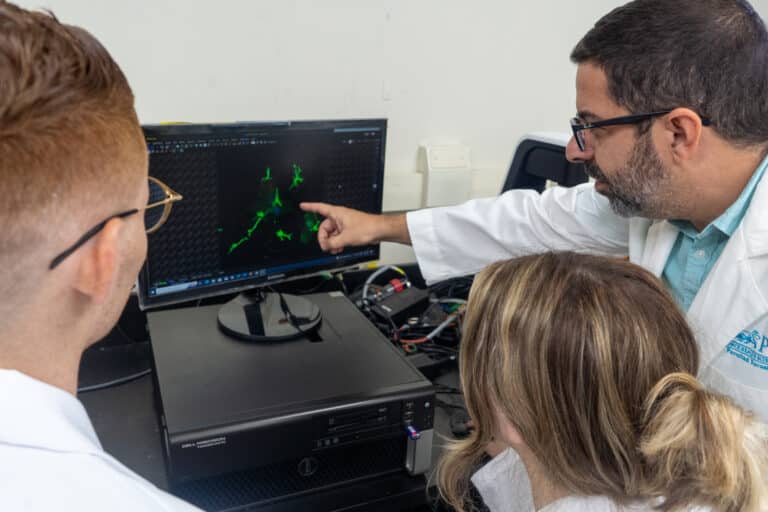Researchers will study the effects of chronic social stress
on the development of ovarian cancer
By: Paula C. Lugo Oquendo
Researchers from Ponce Health Sciences University’s Ponce Research Institute and the Moffitt Cancer Center will test the hypothesis that chronic social stress and distress enhance the early and late progression of ovarian tumors by promoting immunosuppression and that several medications, including aspirin, anti-inflammatories, antihypertensives, and cholesterol-lowering medications can interrupt immune dysregulation triggered by distress. This study will analyze data from several ongoing studies that have collected self-reported measures of chronic social stress and distress (e.g., widowhood, social isolation, depression, anxiety) in diverse populations. In addition, the study will use experimental ovarian cancer models to examine the role of chronic stress in promoting inflammation and disease progression. Finally, the study team will determine if aspirin and other medications can block the effects of chronic stress on immune dysregulation and ovarian tumor growth.
Dr. Guillermo N. Armaiz-Peña, co-principal investigator of this study, reported that a growing body of evidence indicates that the biological response to chronic social stress may drive the progression of ovarian precursor lesions and the development of invasive cancer through prolonged and sustained release of stress hormones. “Although it is known that chronic social stress causes persistent inflammation, there are still questions about how stress-related processes affect the immune response to tumors,” said Armaiz-Peña, adding that this study is supported by a five-year grant of $3,637,875, awarded by the National Cancer Institute.
Armaiz-Peña further said that this study integrates human populations and experimental approaches to explain how stress-induced signaling pathways alter immunity associated with ovarian tumors, especially immunosuppressive cell types, and to evaluate anti-inflammatory drugs that can mitigate these effects. “The proposed synergistic approach will shed light on the mechanisms by which chronic stress and distress enhance early and late disease progression and provide new targets for cancer interception,” said Armaiz-Peña.
Armaiz-Peña is joined in this study by Dr. Shelley Tworoger as co-principal investigator and several researchers from the Moffitt Cancer Center in Tampa. The study team’s objective is to understand the interplay between chronic social stress/distress and tumor immune response. “This innovative study will enable future work to identify women at increased risk for tumor-related immunological profiles associated with poor prognosis and to develop novel immunoprevention strategies, pharmacotherapies, and psychosocial interventions to prevent and treat invasive ovarian cancer in women who experience chronic social stress and distress,” added Dr. Armaiz-Peña.
Ponce Health Sciences University is a university focused on the disciplines of Medicine, Clinical Psychology, Biomedical Sciences, Public Health, Nursing and Dental Medicine. Since 1977, they have developed highly trained professionals in the healthcare field. Its educational center in San Juan offers a master’s degree in Medical Sciences, a master's degree in Educational Psychology, and a doctorate in Clinical Psychology. It also has a campus in St. Louis, MO.
Armaiz-Peña further said that this study integrates human populations and experimental approaches to explain how stress-induced signaling pathways alter immunity associated with ovarian tumors, especially immunosuppressive cell types, and to evaluate anti-inflammatory drugs that can mitigate these effects. “The proposed synergistic approach will shed light on the mechanisms by which chronic stress and distress enhance early and late disease progression and provide new targets for cancer interception,” said Armaiz-Peña.
Armaiz-Peña is joined in this study by Dr. Shelley Tworoger as co-principal investigator and several researchers from the Moffitt Cancer Center in Tampa. The study team’s objective is to understand the interplay between chronic social stress/distress and tumor immune response. “This innovative study will enable future work to identify women at increased risk for tumor-related immunological profiles associated with poor prognosis and to develop novel immunoprevention strategies, pharmacotherapies, and psychosocial interventions to prevent and treat invasive ovarian cancer in women who experience chronic social stress and distress,” added Dr. Armaiz-Peña.
Ponce Health Sciences University is a university focused on the disciplines of Medicine, Clinical Psychology, Biomedical Sciences, Public Health, Nursing and Dental Medicine. Since 1977, they have developed highly trained professionals in the healthcare field. Its educational center in San Juan offers a master’s degree in Medical Sciences, a master's degree in Educational Psychology, and a doctorate in Clinical Psychology. It also has a campus in St. Louis, MO.
